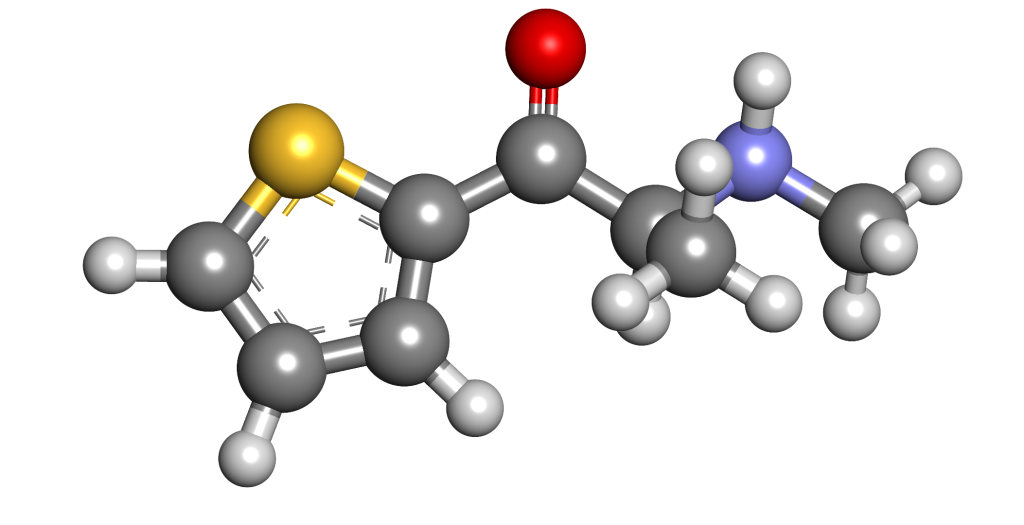Summary
Thiothinone, also known as βk-MPA, is a stimulant classified as the beta-keto substituted counterpart of methiopropamine. It has gained popularity as a designer drug and has been available for purchase on online platforms. Structurally, Thiothinone resembles methcathinone, except that the phenyl group has been replaced by a thiophene group.
Interestingly, Thiothinone has also been identified as a pyrolysis byproduct of methiopropamine.
| Identifiers | |
|---|---|
| IUPAC name | |
| CAS Number | 24065-17-6 54817-67-3 (hydrochloride) |
|---|---|
| PubChem CID | 12198617 |
| ChemSpider | 16113492 |
| UNII | 8C758Z7L72 |
| Chemical and physical data | |
| Formula | C8H11NOS |
| Molar mass | 169.24 g·mol−1 |

FAQ
- What is Thiothinone?
- Thiothinone is a chemical compound that belongs to the class of synthetic cathinones. It is a derivative of methcathinone and shares structural similarities with amphetamines. Thiothinone is known for its stimulant properties and has been associated with psychoactive effects.
- Is Thiothinone Legal?
- The legal status of Thiothinone varies by country and region. It may be regulated as a controlled substance in some places due to its potential misuse. It’s essential to check your local laws and regulations to ensure compliance.
- What Are the Effects of Thiothinone?
- Thiothinone is primarily a stimulant drug. Users report effects such as increased alertness, energy, and euphoria. However, like other synthetic cathinones, it may also have adverse effects, including anxiety, paranoia, and potential health risks.
- How is Thiothinone Used?
- Thiothinone is typically used for oral ingestion, insufflation (snorting), or vaporization. Users should exercise caution and be aware of the potential risks associated with its use, as accurate dosing can be challenging with unregulated substances.
- What Are the Dangers and Side Effects of Thiothinone?
- Thiothinone and other synthetic cathinones can pose several health risks, including increased heart rate, elevated blood pressure, dehydration, anxiety, and even more severe symptoms like psychosis or hallucinations. The long-term effects of Thiothinone are not well-documented.
- Is Thiothinone Addictive?
- Synthetic cathinones, including Thiothinone, have the potential to be addictive. Users may develop a tolerance and experience withdrawal symptoms when trying to quit. It’s essential to be aware of the addictive nature of such substances and seek help if needed.
- Is Thiothinone the Same as Methcathinone?
- While Thiothinone is derived from methcathinone and shares structural similarities, they are not the same. Thiothinone may have different effects, dosages, and potential risks than methcathinone.
- Are There Any Known Medical Uses for Thiothinone?
- Thiothinone does not have any approved medical uses. It is primarily encountered as a recreational or designer drug and has not undergone clinical testing for therapeutic purposes.
- How Can I Stay Safe if I Encounter Thiothinone or Similar Substances?
- If you come across Thiothinone or any unfamiliar substances, it’s crucial to exercise caution. Avoid experimentation, as synthetic cathinones can be unpredictable and harmful. Always seek information from reputable sources and consult with healthcare professionals if you have concerns about substance use.
- Do Authorities monitor Thiothinone?
- The legal status and monitoring of Thiothinone may vary by location. Some countries and regions may classify it as a controlled substance, while others may not. To stay informed about its status in your area, refer to local drug enforcement agencies and regulations.
References
- “2-Thiothinone (hydrochloride)”. Cayman Chemical. Retrieved on September 9, 2015.
- Blicke FF, Burckhalter JS (March 1942). “α-Thienylaminoalkanes”. Journal of the American Chemical Society. 64 (3): 477–480. doi:10.1021/ja01255a001.
- Gambaro V, Casagni E, Dell’Acqua L, Roda G, Tamborini L, Visconti GL, Demartin F (January 2016). “Identification and characterization of a new designer drug thiothinone in seized products”. Forensic Toxicology. 34 (1): 174–178. doi:10.1007/s11419-015-0289-2. S2CID 25991798.
- Bouso ED, Gardner EA, O’Brien JE, Talbot B, Kavanagh PV (July–August 2014). “Characterization of the pyrolysis products of methiopropamine”. Drug Testing and Analysis. 6 (7–8): 676–83. doi:10.1002/dta.1571. PMID 24166818.